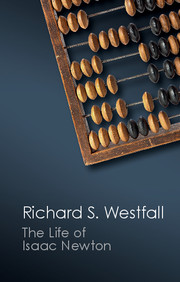Book contents
- Frontmatter
- Dedication
- Contents
- Preface
- Acknowledgments
- A Note About Dates
- Plates
- 1 A Sober, Silent, Thinking Lad
- 2 The Solitary Scholar
- 3 Anni Mirabiles
- 4 Lucasian Professor
- 5 Publication and Crisis
- 6 Rebellion
- 7 Years of Silence
- 8 Principia
- 9 Revolution
- 10 The Mint
- 11 President of the Royal Society
- 12 The Priority Dispute
- 13 Years of Decline
- Bibliographical Essay
- Index
3 - Anni Mirabiles
Published online by Cambridge University Press: 05 October 2015
- Frontmatter
- Dedication
- Contents
- Preface
- Acknowledgments
- A Note About Dates
- Plates
- 1 A Sober, Silent, Thinking Lad
- 2 The Solitary Scholar
- 3 Anni Mirabiles
- 4 Lucasian Professor
- 5 Publication and Crisis
- 6 Rebellion
- 7 Years of Silence
- 8 Principia
- 9 Revolution
- 10 The Mint
- 11 President of the Royal Society
- 12 The Priority Dispute
- 13 Years of Decline
- Bibliographical Essay
- Index
Summary
MORE THAN ANYTHING ELSE mathematics dominated Newton's attention during the months that followed his discovery of the new world of science, although it did not completely obliterate other interests. Sometime during this period he also found time to compose the “Quaestiones,” in which he digested current natural philosophy as efficiently as he did mathematics. The other mathematicians and natural philosophers of Europe were unaware that a young man named Isaac Newton even existed. To those who knew of him, his fellow students in Trinity, he was an enigma. The first blossoms of his genius flowered in private, observed silently by his own eyes alone in the years 1664 to 1666, his anni mirabilis.
In addition to mathematics and natural philosophy, the university also made certain demands on his time and attention. He was scheduled to commence Bachelor of Arts in 1665, and regulations demanded that he devote the Lent term to the practice of standing in quadragesima. Pictured in our imagination, the scene has a surrealistic quality, medieval disputations juxtaposed with the birth pains of the calculus. An investigation of curvature was dated 20 February 1665, in the middle of the quadragesimal exercises, and in his various accounts of his mathematical development he assigned the binomial expansion to the winter between 1664 and 1665. While Stukeley was a student at Cambridge more than thirty years later, he heard that when Newton stood for his B.A. degree “he was put to second posing, or lost his groats as they term it, which is look'd upon as disgraceful.” The story raises several problems. The senate had already passed the grace granting his degree before the exercises were held, and Newton signed for this degree with the other candidates. If the story has any substance, it has to apply to prior examinations in the college. Nevertheless, as Stukeley remarked, it does not seem strange because Newton was not much concerned with the standard curriculum. Once more the laxity of the university worked to his advantage. Newton commenced B.A. largely because the university no longer believed in its own curriculum with enough conviction to enforce it.
In the summer of 1665, a disaster descended on many parts of England, including Cambridge. It had “pleased Almighty God in his just severity,” as Emmanuel College put it, “to visit this towne of Cambridge with the plague of pestilence.
- Type
- Chapter
- Information
- The Life of Isaac Newton , pp. 37 - 60Publisher: Cambridge University PressPrint publication year: 2015



